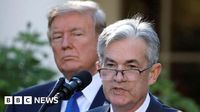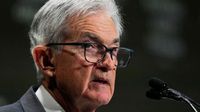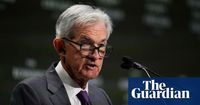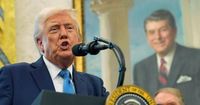United States President Donald Trump has recently softened his stance on Federal Reserve Chair Jerome Powell, backing off threats to remove him from office. During a press conference on April 22, 2025, Trump stated unequivocally, "I have no intention of firing him," while expressing a desire for Powell to adopt a more aggressive approach to lowering interest rates. This shift in tone comes in the wake of substantial market turmoil triggered by Trump's earlier criticisms of Powell, whom he had previously labeled a "major loser" for not supporting rate cuts more vigorously.
Trump's comments were welcomed by investors, as US stock futures surged following his remarks. Contracts linked to the S&P 500 rose over 1.70 percent, while those associated with the Nasdaq-100 climbed by more than 1.90 percent. The US dollar also gained more than 1 percent against major currencies, reflecting renewed investor confidence.
Earlier in the day, US Treasury Secretary Scott Bessent had commented that the ongoing trade war with China was "unsustainable," suggesting a potential de-escalation in tensions. His remarks led to a rally on Wall Street, with the S&P 500 closing up over 2.5 percent and the Nasdaq finishing more than 2.7 percent higher. Asian markets mirrored this optimism, with Japan's Nikkei 225 and South Korea's KOSPI both opening higher on April 23, 2025.
Despite this positive momentum, the backdrop of Trump's aggressive trade policies remains a concern. Since returning to the White House in January, Trump has imposed tariffs as high as 145 percent on numerous Chinese imports, prompting retaliatory measures from Beijing, including a 125 percent tax on US goods. On April 22, Trump acknowledged the tariffs were "very high" and indicated they would "come down substantially," although he stopped short of suggesting they would reach zero.
The trade war has created uncertainty in the financial markets, with economists warning that such tariffs could lead to inflationary pressures. In a recent statement, Powell cautioned that the tariffs could exacerbate inflation, a sentiment that has drawn Trump's ire. Trump has consistently argued that the Federal Reserve should lower interest rates to stimulate economic growth, especially in light of the economic drag caused by his tariffs.
In the Oval Office, Trump reiterated his belief that the current economic climate called for lower interest rates, stating, "This is the perfect time to lower interest rates. If he doesn’t, is it the end? No, it’s not." His comments reflect a growing impatience with the Fed's cautious approach to monetary policy, which has not seen a rate cut since December.
Trump's recent rhetoric had raised alarms among his advisers, who warned that attempting to remove Powell could lead to significant market disruptions, akin to the turmoil caused by the trade war. Following Trump's aggressive comments on social media, which included a post stating that Powell's "termination cannot come fast enough!", many in the administration were concerned about the implications for market stability.
In light of these concerns, Trump's backtracking on Powell's potential dismissal has brought a sense of relief to Wall Street. Dow futures shot up by 750 points, or 1.9 percent, on April 23, indicating a strong rebound in investor sentiment. S&P 500 futures increased by 2.6 percent, while Nasdaq futures rose by 3 percent, as confidence in the stability of the Federal Reserve returned.
White House Press Secretary Karoline Leavitt defended Trump's critical stance towards the Fed, suggesting that Powell's decisions may have been influenced by political considerations rather than purely economic factors. Leavitt stated, "The president believes they have been making moves and taking action in the name of politics rather than the name of what’s right for the American economy." However, there is no evidence to support claims that the Fed has acted politically, and Powell has consistently denied any such allegations.
As the financial markets continue to react to Trump's statements, the potential for a trade deal with China remains uncertain. Trump has indicated a willingness to negotiate, describing his approach as being "very nice" in discussions with Beijing. This contrasts sharply with the aggressive tariff policies that have characterized his administration's dealings with China thus far.
In a broader context, the International Monetary Fund (IMF) recently downgraded its forecast for US economic growth, citing the uncertainty created by Trump's tariffs as a significant factor. The IMF warned that the sharp increase in tariffs could lead to a "significant slowdown" in global growth, further complicating the economic landscape.
As the situation develops, Trump's administration appears to be setting the stage for potential negotiations with China, with Bessent expressing optimism about reaching a trade deal. However, the ongoing trade war continues to cast a long shadow over the US economy, and the ramifications of Trump's policies will likely unfold in the coming months.
In summary, President Trump's recent statements reflect a notable shift in his approach to both the Federal Reserve and trade relations with China. By backing off threats to remove Powell and acknowledging the need for a reassessment of tariffs, Trump may be aiming to stabilize markets and restore investor confidence amid ongoing economic challenges.







